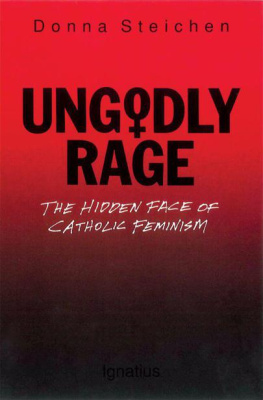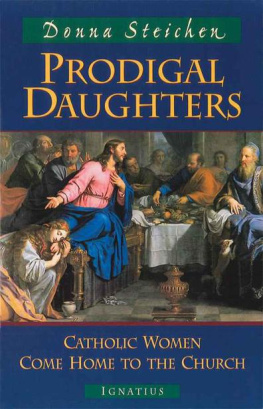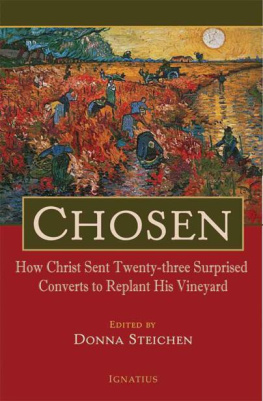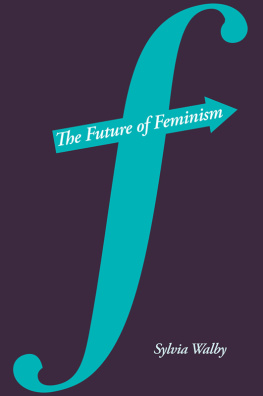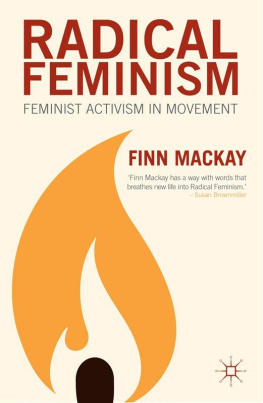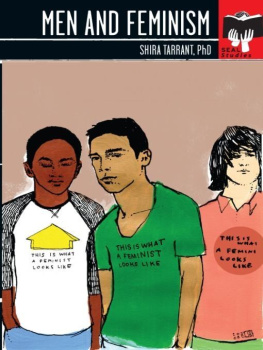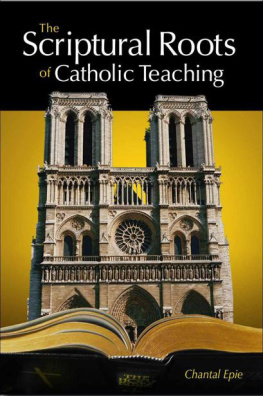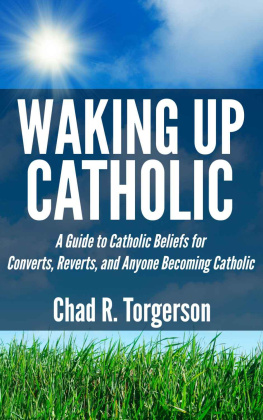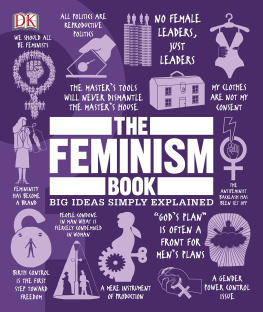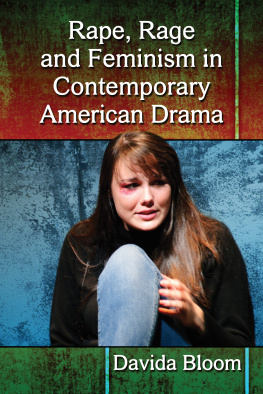Donna Steichen - Ungodly Rage: The Hidden Face of Catholic Feminism
Here you can read online Donna Steichen - Ungodly Rage: The Hidden Face of Catholic Feminism full text of the book (entire story) in english for free. Download pdf and epub, get meaning, cover and reviews about this ebook. year: 1991, publisher: Ignatius Press, genre: Religion. Description of the work, (preface) as well as reviews are available. Best literature library LitArk.com created for fans of good reading and offers a wide selection of genres:
Romance novel
Science fiction
Adventure
Detective
Science
History
Home and family
Prose
Art
Politics
Computer
Non-fiction
Religion
Business
Children
Humor
Choose a favorite category and find really read worthwhile books. Enjoy immersion in the world of imagination, feel the emotions of the characters or learn something new for yourself, make an fascinating discovery.
- Book:Ungodly Rage: The Hidden Face of Catholic Feminism
- Author:
- Publisher:Ignatius Press
- Genre:
- Year:1991
- Rating:5 / 5
- Favourites:Add to favourites
- Your mark:
- 100
- 1
- 2
- 3
- 4
- 5
Ungodly Rage: The Hidden Face of Catholic Feminism: summary, description and annotation
We offer to read an annotation, description, summary or preface (depends on what the author of the book "Ungodly Rage: The Hidden Face of Catholic Feminism" wrote himself). If you haven't found the necessary information about the book — write in the comments, we will try to find it.
Ungodly Rage: The Hidden Face of Catholic Feminism — read online for free the complete book (whole text) full work
Below is the text of the book, divided by pages. System saving the place of the last page read, allows you to conveniently read the book "Ungodly Rage: The Hidden Face of Catholic Feminism" online for free, without having to search again every time where you left off. Put a bookmark, and you can go to the page where you finished reading at any time.
Font size:
Interval:
Bookmark:
UNGODLY RAGE THE HIDDEN FACE OF CATHOLIC FEMINISM
DONNA STEICHEN
The Hidden Face of Catholic Feminism
IGNATIUS PRESS SAN FRANCISCO
Cover by Roxanne Mei Lum
With ecclesiastical approval
1991 Ignatius Press, San Francisco
All rights reserved
ISBN 0-89870-348-4
Library of Congress catalogue number 90-84593
Printed in the United States of America
Contents
There shall be no strange god among you
nor shall you worship any alien god .
I, the Lord, am your God
who led you forth from the land of Egypt
But my people heard not my voice ,
and Israel obeyed me not ;
So I gave them up to the hardness of their hearts ;
they walked according to their own counsels .
Psalm 81
The life we joined in 1960 is like the old Mother-house: gone without a trace. Maybe it was all a dream .Catherine Victory
Foreword
Mother Teresa of Calcutta has said, Words which do not give the light of Christ increase the darkness. This book is about darkness. Its pages document one of the most devastating religious epidemics of our, or any other, timean infectious and communicable disease of the human spirit for which there is no easy cure, and which afflicts not only the carriers, but nearly all religious believersincluding our children, the future of the human race and the future of the Church. The book should be read attentively by all who are concerned about or responsible for the religious welfare and spiritual development of others.
This disease, the source of the ungodly rage of the title, has a name: feminism. The evidence contained in these pages may cause a few sleepless nights for some bishops and clergy who have regarded the feminist influence in the Church and feminist issues (like inclusive language and female altar servers) as of little real importance, or who have convinced themselves that radical religious feminism is so loony it will burn itself out in due course with little damage done to the Church. Donna Steichens penetrating account, based on hours of personal interviews and attendance at feminist gatherings, sounds a necessary alarm.
Among the phenomena Mrs. Steichens diligent reporting reveals is the relentless iconoclasm of religious feminism (the rage) coexistent with a calculated effort to remythologize Christianityto substitute a concocted changeling myth for perennial religious truth. Feminisms iconoclasm and mythmaking result from profound spiritual malaise, a predictable consequence of the erosion of confidence in human reason during a century fraught with cataclysmic wars and social upheavals, compounded by the manifest weakening of nearly every established social institution, including the Church. Traditional forms of piety have virtually disappeared during the past twenty years, and the transcendent dimension of religion has been, for a variety of reasons, obscured. But the effects of religious feminism have been to produce further anguish and confusion and to deepen divisions rather than to accomplish healing and restoration and unity.
In direct proportion to waning confidence in the rational faculty, feminists desire to affix blame for our predicament, to find a scapegoat and immolate him and to create an oxymoronic new tradition, a new prevailing myth and a means whereby we can construct with our own wills and liberated imaginations a radically new social and cultural structurea new Tower of Babel, stripped of the originals flaws, purged of the stink of the past and rising from a foundation swept clean of all the rubble of former allegiances and ties and beliefs. This objective has become a compulsion for feminist social reformers and professional religious.
The principal targets of feminist re-formation are the Catholic Church and women, for the very good reason that both provide strong links with the past and both are primary transmitters to future generations of received culture and perennial religious beliefs. The Catholic Church uniquely represents and embodies all of Christianity, which has provided the moral and ethical foundation of our civilization. Women, who literally bear within their bodies the future of humanity, are essential to the establishment ot families, the fundamental unit of any society. The economy of the re-formers strategy thus entails an assault on the faith of the Church through the women of the Churchan ingenious strategy, assuredly, and so far it is working very well.
Recent events in eastern Europe which have effectively discredited Marxist revolutionary social theories have had little or no effect on feminist and other liberationist theologians. The reason for this may be (although I have never seen it stated in their works) that classic Marxism viewed religion per se as a defect of mans imagination to be overcome, whereas religion is, of course, the theologians stock-in-tradein fact, their livelihood. (Is it cynical to suggest that people who do theology must endlessly invent new material in order to justify their salaries or simply to stave off boredom?) Perhaps some revolutionary theologians perceive that social theories which attempt to base themselves on human reason alone must eventually fail, precisely because the rational faculty itself is unreliable. Marxist theories may have failed in part because they neglected to integrate the subjective, the personal, the sensualintuitive impulses, emotions, individual experience, feelings, etc.which are integral to human experience and which form an essential part of religious experience. Feminist theologians, in fact, define dualism as the subordination of subjective, intuitive experience (often identified as feminine) to objective, rational intellectual perception (often identified as masculine).
But if feminist and other liberationist theologians perceive the defect inherent in systems and social structures that do not take full account of the subjective, that element within human consciousness that is hidden, interior, dark; if they are reacting to the dimming of the Enlightenment and its ideas of the perfectibility of humanity and society through human reason and if they correctly see the need to integrate the religious impulse into the structures of society; their critique also involves denial of objective truth, which transcends the limitations of a particular culture or individual perception or experience of it. They also reject most traditional manifestations of the religious impulse, especially authentic Christianity.
Feminist theologians have given themselves license to create a New Mythology for a New Age, freed from the oppressive inherited myth they believe was imposed on them by the patriarchy. In claiming their power they feel compelled to reject authority (though they are quite willing to exercise power over others). They seek to impose their new morality on the rest of the world, to manipulate and politicize language, to deconstruct texts of Scripture and re-construct them according to the feminist hermeneutic of suspicion and to inhabit and use the established structures of Christianity (i.e., the churches) in order to effect a collapse from within. One of the most dishonest of the New Myths is the claim of feminist zealots to speak in the name of all womenincluding those who are not yet aware of oppression by the patriarchal Church.
Other examples abound. The new Spirit invoked by feminist theologians gives them power to smash the idols of Church and culture; and the God of feminism, as Monika Hellwig writes in The Role of the Theologian in Todays Church , creates human persons in the divine image by awakening them into freedom, self-determination and creativity in which they discover that they are essentially relational... in this they are fulfilling and realizing the creativity of God; when they shape communities which offer liberation, happiness and fulfilling relationships to all, they fulfill the purpose of creation; then all creation is drawn into a great harmony and returns to the Creator in peace, and God is glorified.
Next pageFont size:
Interval:
Bookmark:
Similar books «Ungodly Rage: The Hidden Face of Catholic Feminism»
Look at similar books to Ungodly Rage: The Hidden Face of Catholic Feminism. We have selected literature similar in name and meaning in the hope of providing readers with more options to find new, interesting, not yet read works.
Discussion, reviews of the book Ungodly Rage: The Hidden Face of Catholic Feminism and just readers' own opinions. Leave your comments, write what you think about the work, its meaning or the main characters. Specify what exactly you liked and what you didn't like, and why you think so.

